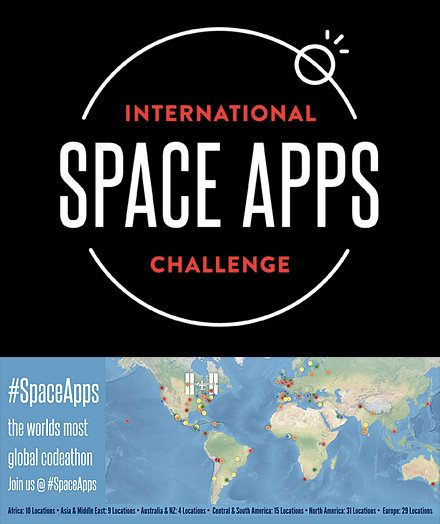This weekend is the third annual International Space Apps Challenge, a NASA incubator innovation program. The challenge is a global collaboration between government agencies, organizations, academic institutions, and individuals from across the planet. Over 9,000 people participated simultaneously in last year’s event from over 50 locations. This year features almost 100 locations spanning six continents, including 31 locations in North America, 29 locations in Europe, 15 locations in South America, 10 locations in Africa, 9 locations in Asia, and 4 locations in Australia and New Zealand.
In San Francisco, the Space Apps Challenge will take place at Constant Contact, located at 85 2nd Street, just a few feet from where the How Weird Street Faire takes place. San Francisco’s event is organized and run by former Space Apps winners SpaceRocks. The SpaceRocks team was one of two San Francisco teams selected for global judging in the 2013 NASA Space Apps Challenge, winning an honorable mention globally in the “Galactic Impact” category for the SkyLog social stargazing app.

The 2014 worldwide hackathon will take place April 12-13. Participants from all around the world will develop mobile applications, software, hardware, data visualization, and platform solutions that could contribute to space exploration missions and help improve life on Earth. The challenge encourages entrepreneurs, technologists, thinkers, and developers to create and deploy data-driven visualizations and simulations that will help people understand and solve problems related to life on earth and space. More than 200 data sources, including data sets, data services, and tools will be made available. This event will bring tech-savvy citizens, scientists, entrepreneurs, educators, and students together to help solve challenges relevant to both space exploration and social needs. This year, the challenges will be organized in five themes: Earth Watch, Technology in Space, Human Spaceflight, Robotics, and Asteroids. About half of the challenges are in the Earth Watch theme, which supports NASA’s focus on Earth science in 2014. The challenges range from turning your smartphone into a satellite to monitor air quality, to designing a space-greenhouse.
According to NASA, “the event embraces collaborative problem solving with a goal of producing relevant open-source solutions to address global needs applicable to both life on Earth and life in space.” One of the winners from 2013 was the Greener Cities Project, which was honored in the “Galactic Impact” division. The Gothenburg, Sweden based team behind Greener Cities Project set out to complement NASA satellite climate data with crowd-sourced microclimate data obtained through low-cost sensors, network connectivity, and urban gardens, thus providing higher resolution environmental monitoring capability. The Kansas City-based Sol project, which was described as the world’s first interplanetary weather application, won last year’s Space Apps Challenge for “Best Use of Data”. Sol allows users to select a planet and view the weather on that world.
Everyone is encouraged to participate in the challenge, even if they have no programming experience. The International Space Apps Challenge is an opportunity for people to build, create, and invent new solutions to challenges of global importance. NASA explains that “the exploration of space is, by necessity, a unified international effort – and diversity of experience and perspective inevitably produces a better product. The Challenge exemplifies the principles of transparency, participation, and collaboration by utilizing openly available data, supplied through NASA missions and technology, and the talent and skill of passionate volunteers from around the planet to advance space exploration and improve the quality of life on Earth. The idea of a Challenge is so compelling because it acknowledges the fact that the world is facing serious challenges – and that we all have to work together to approach them. While there are prizes offered for great solutions, the main challenge we focus on is enabling 48 hours of highly engaged collaboration- and discovering what we can create when that happens.”
